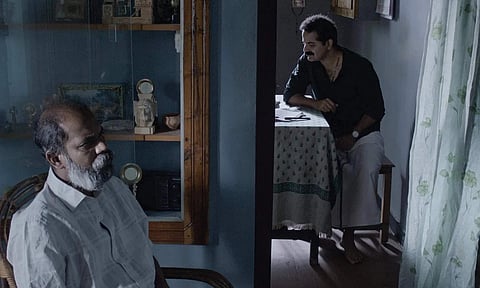IFFR 2023: Don Palathara's extraordinary Family paints a tranquil yet unsettling picture
Rating:(4.5 / 5)
Don Palathara's films are testaments to the adage that you don't always have to move the camera to register an unnerving sensation. Here's a filmmaker who has by now created a signature aesthetic that adopts an observer's point of view, either from a distance or up close, and his films benefit from that approach. In his new film Family, he spares the viewer from some of the most disturbing acts which occur off-screen. In one instance, a character seated so close to the perpetrator, but obscured partially by a wall, is oblivious to what is happening.
Director: Don Palathara
Cast: Vinay Forrt, Divya Prabha, Nilja K. Baby, Mathew Thomas
The method of visual storytelling Don employs here is the kind that makes things evident without showing much. He applies a near-mathematical logic to the composition -- precise and clinical -- reminiscent of the transcendent style that characterised the works of Robert Bresson and Yasujiro Ozu practised. Don trains our attention on a particular image for the appropriate duration to let us absorb all the necessary details. At a time when most 'content' increasingly panders to the deteriorating attention spans with lazy filmmaking and cheap gimmicks, Don's latest work feels wholesome, akin to a piece of literature.
The title of Don's film alludes more to the community in which members of one large Christian family, living in different homes and bearing distinct and complex personalities, belong, than a singular one. The character establishment begins in the opening moment, when Vinay Forrt's character, Sony, drops off his school-going nephew. You sense something amiss when the boy, who will, through the span of the film, express admiration for the man, sports a strange expression. Sony is a 'community man' evident from the several vignettes depicting him participating in every activity pertaining to his relatives or faith. Family relatively feels larger in scale when placed next to Don's previous work, owing to the number of characters occupying the frames and how there is always some activity going on.
Through its studious examination of deviant behaviour and repressed emotions, the film, which just premiered at the International Film Festival of Rotterdam, makes one ask some uncomfortable questions. How well do we know the people around us? How much of the goodwill attached to an individual is genuine? Does every person who offers to help you do so with a dubious agenda? How many "good-intentioned" predators live amongst us without remorse? The discomfort intensifies when the concept of church confessions and absolution becomes involved. It's an aspect often noted in some of Martin Scorsese's most notable works, albeit explored differently.
This idea of making one's sins "go way" by chanting a few prayers... The notion of sending a troublemaker to a retreat, or marrying them off, to 'fix' character defects... How does that really work? Imagine the amount of damage done by a religious institution and a community that acts as though nothing is wrong. In one instance, there is talk of daughters getting corrupted if sent to another city. In another, a parent's pride and honour get badly hurt when their child does something out of the ordinary. But Don refrains from portraying violence, whether inflicted on another or oneself.
The predator-prey analogies show up in fascinating ways when the locals keep mentioning the presence of a leopard lurking in the area. Perhaps another brief awkward moment with a boy engaged in fishing is also supposed to tell us something. The abundant woods and foliage offered by the Idukki terrain form a camouflage for the unspeakable events occurring within their confines and lend a sense of alienation to the proceedings. It's worth noting that some of the most notable dysfunctional family dramas, such as Irakal, Joji, Appan, and the grossly underappreciated Chattambi, were set in the same area.
Anyone who has explored Don's filmography will note in Family a few themes and imagery common to his earlier films such as Vith and 1956, Central Travancore -- aside from the Idukki milieu, of course. And in the wake of the MeToo movement, one can draw real-life parallels between the events in the film to the dismissal of some survivor testimonials because the perpetrators are known for their 'respectable' standing in society -- when their philanthropic or other acts of benevolence, genuine or otherwise, are used as armour against any potential future attempts at exposing their true selves.
While the final freeze frame of Family is unsettling owing to the lack of closure, it teases, in our mind, the possibility of severe retribution, albeit unseen. Isn't that what great movies do -- continue playing in our minds?

